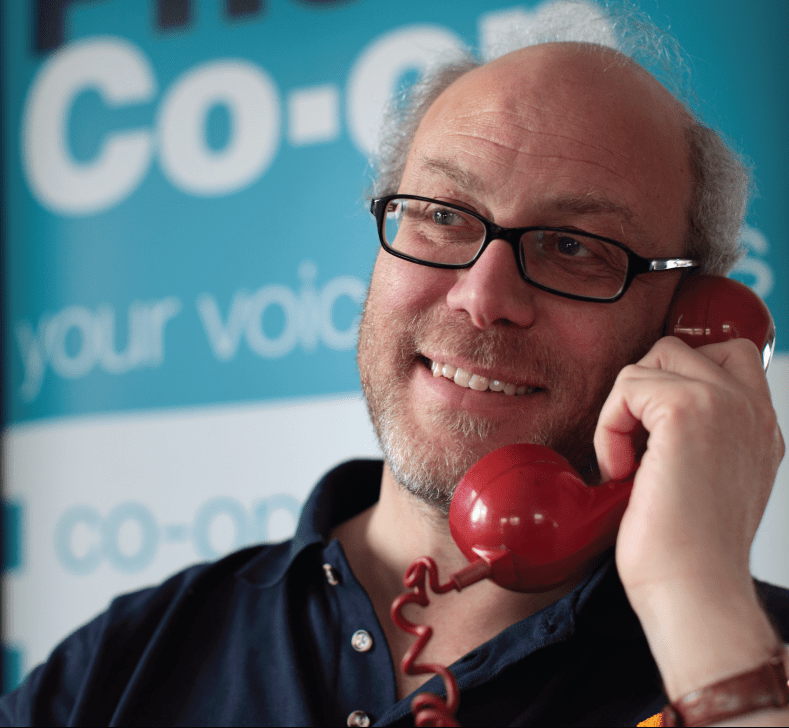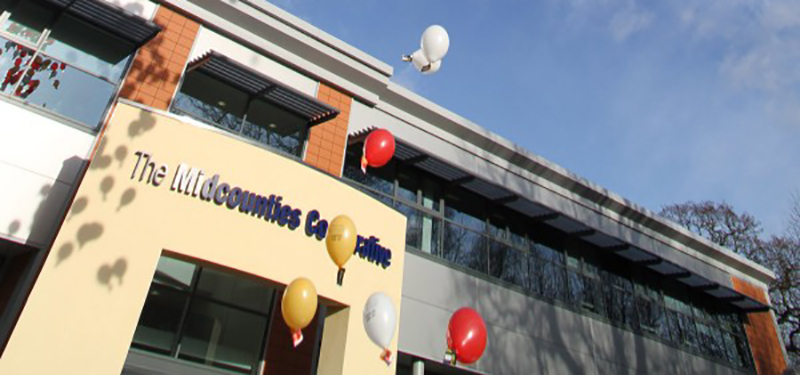As founder of The Phone Co-op 20 years ago, I think the time is right for me to share my personal view about the proposal put forward by the board for a transfer of engagements to the Midcounties Co-operative. I am vice-president of Midcounties so of course I must declare an interest. I stepped down as chief executive of The Phone Co-op last year to launch the new Phone Co-op Foundation for Co-operative Innovation. I am writing this in a personal capacity, not only as The Phone Co-op’s founder but as someone who has the benefit of intimate knowledge of both parties to the proposed merger.
The bad old days when it was considered eccentric to talk about values
I first became involved in Oxford and Swindon Co-op, as it then was, back in 1983, when I was 21. After a frustrating exchange of letters with the society about its refusal to support the international boycott against apartheid by removing South African goods from its stores, I ended up putting a motion to ban them at a members’ meeting. We didn’t win the vote. However, I was struck by the realisation that this was an organisation that seemed to have lost its sense of purpose. Its vision seemed limited to being a pale imitation of its competitors, and it was in rapid decline. I resolved to get involved more deeply. I began to get a sense that we might really change things when, 18 months later, the same motion was passed and the board decided to ban South African goods. Over the years that followed, a group of like-minded co-operators pressed the local co-op, and the movement nationally, to try to work out what the Rochdale Principles and the Pioneers’ vision would mean in the context of the late 20th century. There was no doubt the Pioneers’ aspiration was to humanise the way the economy worked, and we felt that should also be the aim of the modern movement that grew from them.
Related… The Phone Co-op to recommend a transfer of engagements to Midcounties Co-operative
Two years after my first members’ meeting, I was elected, along with two colleagues from our campaign, to Oxford and Swindon Co-op’s board. We argued that the co-op needed to put its distinctive values at the heart of its appeal to the public, as well as modernise its operations. Many co-op managers I encountered back then were openly sceptical of such ideas. They appeared unwilling to adopt any kind of vision based on values, regarding this as “woolly” or “extremist”. Oxford, Swindon and Gloucester Co-op took a lead when, in the 1990s, this began to change. Our new chief executive Bob Burlton shared the same vision and successfully trialled the “MOCA” (Marketing our Co-operative Advantage) concept developed by Tom Webb in Canada in our food stores.

Why I started the Phone Co-op
In the mid-1990s I was working on projects to support co-ops in central and eastern Europe. We had high international phone bills. New providers were entering the market and by switching to one, we were able to save quite a bit. Curious about how this all worked, I asked our contact in the new provider. He told me that they bought calls wholesale and sold them on to their customers. It immediately occurred to me that there was a potential consumer co-op waiting to happen and over the next few years the idea took shape. Operating in an industry that was a former state monopoly, where many new entrants were known for dodgy selling practices and financial instability, there was room for a service provider that put values and people front and centre. And so the idea of the Phone Co-op was born. For me personally, and for some others, it was also a chance to demonstrate that it was possible to grow a consumer co-op that was successful because it was different from the rest, and because that difference was about being a co-op whose values shone out.
The wider movement was also changing
2001 saw the launch of the Co-operative Commission Report, spurred by the threat to mutuality embodied by the unsuccessful attempt by Andrew Regan to demutualise the CWS (precursor of the Co-operative Group). The Commission also argued that social goals built around co-op values needed to be at the heart of the movement’s success. The Phone Co-op was mentioned at the launch of the report in 10 Downing Street. It was getting noticed. It was growing fast and was outperforming the wider movement in terms of profitability too. The Phone Co-op enshrined its values in its purpose and vision statements, which said we wanted to inspire others with a better model for business and the economy and to be a global beacon of co-operation.
The Co-op Bank also decided to put ethics at the core of its marketing approach. Gradually the wider retail movement began to change too, cleaning up its governance and making more of its values. The biggest step in this direction was perhaps the launch of the national co-op brand in 2008, which was later adopted by The Phone Co-op. Retail Co-ops also began to explore new trading activities. Co-op Group entered the legal services market, and Midcounties (formed by in 2005 the merger of Oxford, Swindon and Gloucester Co-op with West Midlands Co-op) grew childcare and energy businesses.
Related… Interview: Nick Thompson, new CEO of the Phone Co-op
The Phone Co-op as a catalyst for change
It is heartening to read in Ben Reid’s letter to Phone Co-op members how the success of the Phone Co-op gave Midcounties the confidence to start its energy business. There is no doubt that the Phone Co-op has had influence greater than its size should allow, because it has indeed inspired others to see the consumer co-op model not as something that is stuck in a few specific areas of activity such as retail or funerals, but as being able to address consumers’ needs in a wide variety of industries, and to do so in a way strongly informed by co-operative values. I have no doubt that as the first new mass-market consumer co-op in the UK in at least half a century, it has also boosted the movement’s confidence about what can be achieved in the future.

Why it makes sense to team up with Midcounties
Midcounties has also been expanding the horizons of consumer co-operation in the UK. It is one of the most forward-looking, values-centred consumer co-ops in the country. It has highly able management who have consistently delivered profitable growth and who share its board’s commitment to making co-operative values come alive across the business. There is a natural fit between the energy business and the telecoms activities of the Phone Co-op. Competitors such as Utility Warehouse and First Utility have successfully combined the two, recognising that the more services customers buy from a single provider, the less likely they are to leave. There is a huge cross-selling opportunity: if just 4% of Midcounties members take up the telecoms service it will double the number of telecoms customers. Midcounties’ reach extends beyond that too, to the millions of customers who visit its food stores each week, providing even more potential. I suspect Midcounties will also find it easier than the Phone Co-op to sell business telecoms services to larger customers, because sometimes size matters to IT managers in larger organisations.
Some have questioned whether growth is necessary, asking whether the Phone Co-op shouldn’t stay small. I believe growth is needed in a market where increasing complexity and regulation drive up overheads each year. More importantly, the right kind of growth also enables the Phone Co-op to increase its co-operative impact, inspiring more people with a better model for business and the economy.
The Phone Co-op’s customers, who are generally very “co-op minded” will also be natural prospects for Co-op Energy and travel, and the Phone Co-op’s business customers are also potential customers for Midcounties Co-op’s Employee Benefits business. Midcounties will also benefit from the Phone Co-op’s substantial network of agents and affinity partners as well as the expertise it has in renewable energy generation technologies through its Co-operative Renewables joint venture. There are many committed co-operators among the Phone Co-op’s membership, and if they become engaged in Midcounties they will be influential and valuable members, strengthening its democracy and co-operative focus still further.
All this means that both the Phone Co-op and Midcounties will gain by combining their strengths. Both co-ops operate in tough markets and need all the strength they can get. The proposed merger is a good way to build that strength. The Midcounties board has already voted to accept the transfer.
I strongly urge Phone Co-op members to attend the Special Meeting on 28 April (either in person in Sheffield or online) and to support the transfer of engagements. If that motion is passed by a two thirds majority, a simple majority is also needed at a confirmatory meeting to be held in Droitwich on 12 May.